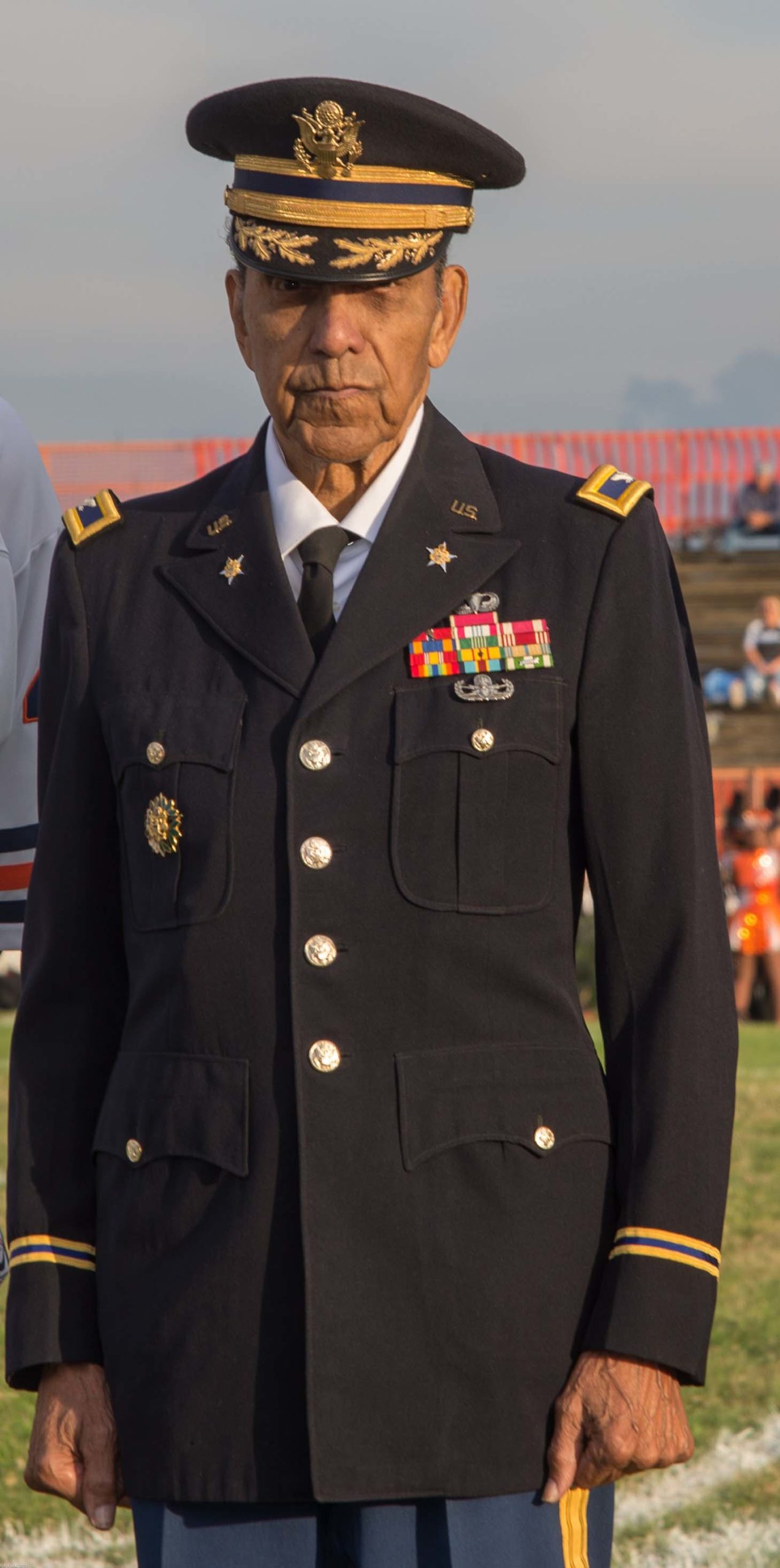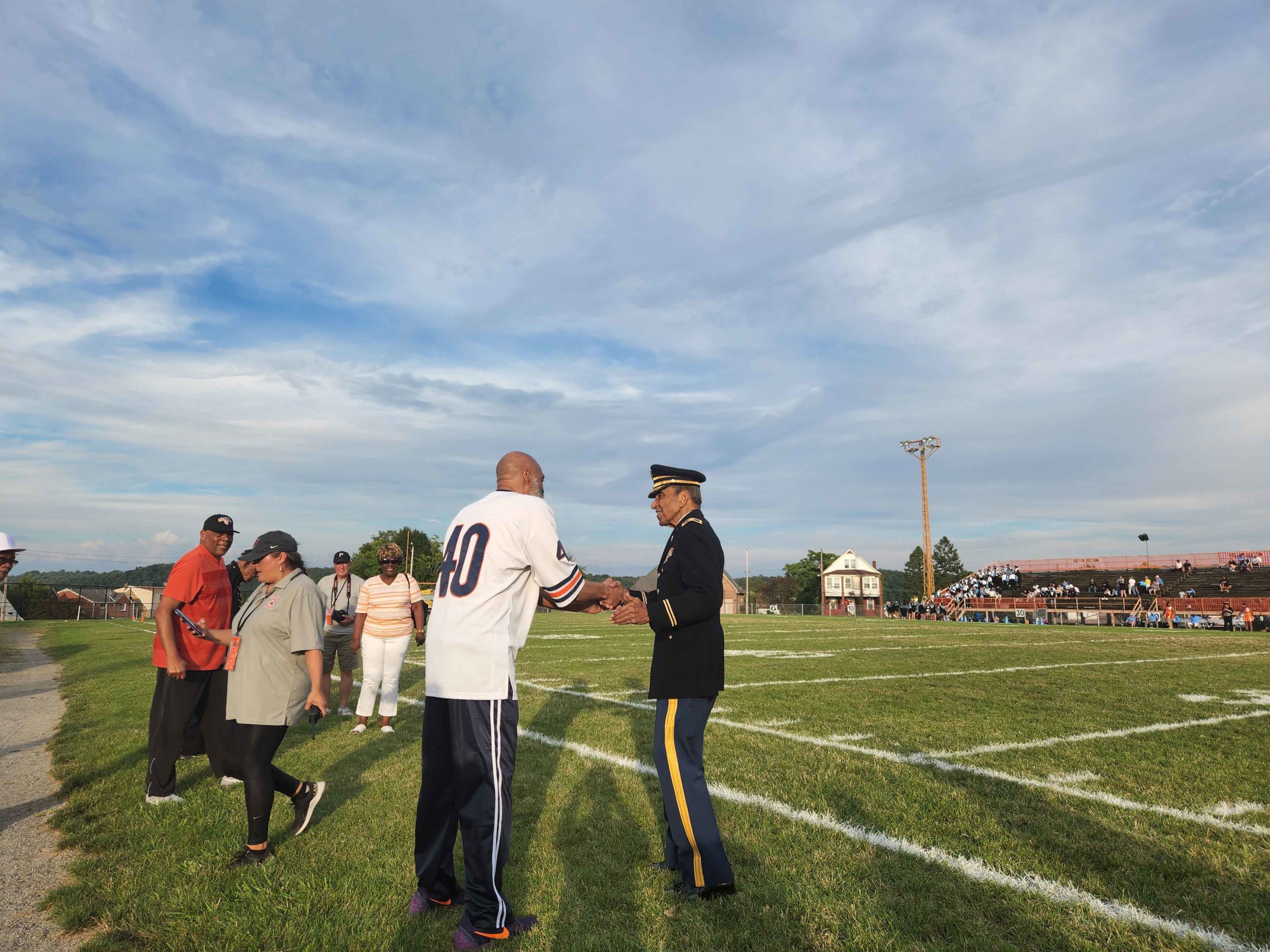COLONEL KENNETH E. COOK, SEATED, WITH HIS FAMILY. THE CLAIRTON COMMUNITY RECOGNIZED COLONEL COOK EARLIER THIS YEAR PRIOR TO A HIGH SCHOOL FOOTBALL GAME.
by Genea L. Webb, For New Pittsburgh Courier
When Retired Army Colonel Kenneth E. Cook thinks about growing up on Chambers and Arch streets in the city of Clairton in the early to mid 1930s, the first word that comes to mind is, opportunity.
That’s where he learned the value of hard work. “Like every town in the region at the time, Clairton was home to hundreds of steel mill workers, who spent long, hard and in some ways dangerous hours toiling for the array of steel mills,” recalled Cook, now 89, who currently resides in Silver Spring, Md.
The widowed father of three graduated from Clairton High School in 1950 and sought higher education at Howard University for pharmacy school, which he graduated from in 1954. Upon graduating and passing his boards, on the recommendation of the Dean of Pharmacy, Cook went to Raleigh, N.C.
“Mrs. Hamlin was looking for a pharmacist and they recommended me. She promised me 20 percent ownership in the pharmacy business, and I accepted that. Her son was half Filipino; he went to pharmacy school, but he didn’t want to be a pharmacist. He wanted to be a farmer,” Cook recalled.
That’s when the draft came calling.
“I had two draft deferments being in college,” Cook said. “Shortly after that I passed the boards and I’m a registered pharmacist, and my draft deferment status ran out, so I got drafted, October 14, 1954, into the Army. I’m in Raleigh and I tell Mrs. Hamlin that I can’t accept 20 percent ownership be cause I have to go, but I intend to come back so I go home. I get to Downtown Pittsburgh. Three hundred seven draftees from Western Maryland, southeastern Ohio, West Virginia and Pittsburgh are signing papers and given a boxed lunch and go down the street to a restaurant, then sent back to the federal building to hurry up and wait, and then I hear, ‘Ken Cook. Where is Kenneth Cook?’ I said, ‘Right here.’ He said, ‘Cook, do you know the difference between a non-commissioned officer and a commissioned officer?’ I say, ‘yeah—non-commissioned officers are corporals and sergeants and commissioned officers are lieutenants and captains.”

Colonel Kenneth E. Cook
“‘Ok, Cook, you’re going to be in charge of this group until you get to Louisville, where you will turn them over to a commissioned officer. Got that?’ I said, ‘Yeah, I got it.’ All the other draftees are probably 18 or 19. I am already 21. I am already a college graduate, so they put me in charge of the group.”
Cook took the instant responsibility seriously.
“We get in Louisville the next morning on an overnight train,” Cook told the New Pittsburgh Courier. “We get off the train—307 scraggily guys, draftees. The station master comes out and says, ‘OK, all you colored boys go around to the side for y’all’s breakfast. The rest of y’all line up by these double doors. I said to the sergeant, ‘Are there any lieutenants around here, or captains?’ He said, ‘no, sir.’ I said, ‘well, I’m in charge and we’ll just get on those buses and go on to Fort Knox. We had dinner last night in Pittsburgh together, we’ll have our breakfast at Fort Knox.’ The station master said, ‘Sergeant, who does this boy think he is? We got a contract with the government!’”
The station master goes inside, Cook said, “and you can see him in the phone booth making a phone call. He comes back out and says, ‘Sergeant, can’t you do something?’ He leaves and makes another phone call and then comes back out and says, ‘Alright, dammit, all y’all just go on in there.’”
And with that, on the morning of October 15, 1954, the main dining room in Louisville, Kentucky, became an integrated dining room.
Once at Fort Knox, Cook was greeted by the commanding officer, a major, “as the one who caused all the trouble this morning down in Louisville.”
“I said, ‘no sir, I did not cause any trouble. We ate last night together in Pittsburgh, and I was placed in charge, so I decided we would eat together today in Louisville or Fort Knox,’” Cook said.
The discussion was over. That act by Cook led to a 31-year career in the United States military.
“My initial thoughts were: “I’ll do my two years and get the hell out,” Cook told the Courier.
But the numerous opportunities in the service kept him in.

Colonel Cook receives honors prior to a Clairton football game.
“I was a platoon leader as a lieutenant, I was a company commander as a captain. I had a battalion equivalent as a major. I was not of the rank yet to have it, but by experience I was given that job,” Cook said. “Somewhere along the line—I don’t know where—I get training in airborne and demolitions to include chemical transporting and overseeing Explosive Ordinance Disposal activities. Opportunity and good luck kept me in.”
Cook, who, among others, was honored prior to a Clairton High School football game on Sept. 2, also played a part in breaking the color barrier in the Clairton city pool when he was a child.
“Even though there were race and class distinctions in and around Pittsburgh, I had not lived the segregated experience that dogged my peers,” Cook said. “My neighborhood and school—the major landmarks of my youth—were integrated undistinguished by ethnicity and nationality. But my home state still practiced separation of the races if not by force but by law. One stark and shameless example was Clairton’s Olympic-sized municipal pool. The indoor pool at the public high school had been integrated since its opening in 1931, but the city pool was for Whites only.”
Attempts to integrate the pool failed early on, but the city pool was ordered closed “until such time that all persons would be admitted without regard to race.” In the summer of 1942, when Cook was 8 years old, the Army Air Corps had taken over the Allegheny County Airport, where they had set up an air base.
“They wanted to use (Clairton’s) Olympic-sized pool for the troops,” Cook recalled. “Keep in mind that this was before the integration of the military forces, which did not occur until 1948. In any case, the city of Clairton finally gave in, and the pool was reopened to all. Dr. (Joseph A.) Randall (a lawyer who had previously fought to integrate the Clairton city pool) was hailed for his efforts by some and hated by others to the point of threats and cross burnings and the like. I do not recall my family being subjected to any direct threats although I was considered a little local hero in the Black community.”
When Cook thinks of Clairton, he thinks of how the city taught him how to recognize and accept opportunity. That’s the same advice Cook wants to give kids who are growing up in Clairton today.
“Believe and achieve,” Cook told the Courier. “Always treat people fairly, even those you don’t like. Don’t say anything bad about anybody and you’ll find out when you go, they won’t say anything bad about you. They may say they didn’t like you, but they won’t hate you. You don’t have to love everybody. Just don’t hate anybody.”